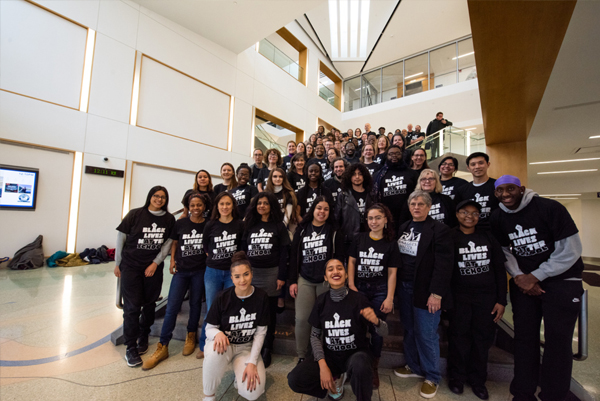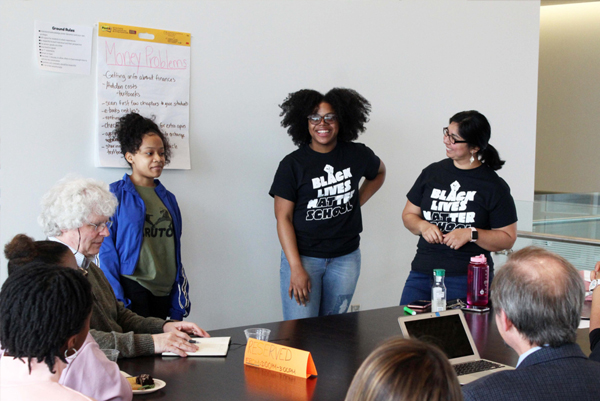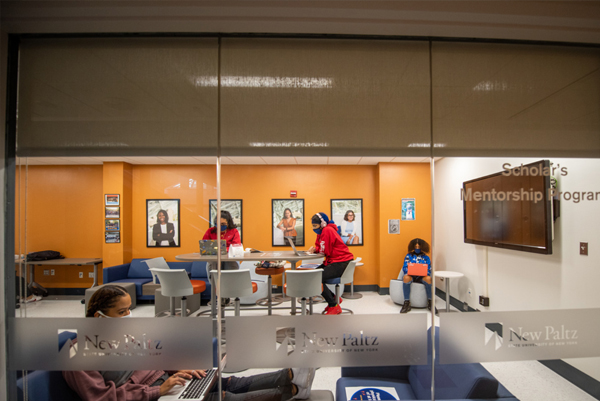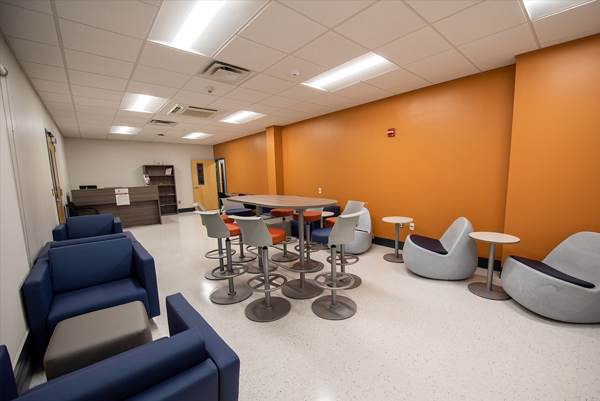Our commitment to become an anti-racist campus
► Bias Response and Support Network.
We will be launching in fall 2020 a bias response and support process to formalize avenues for all members of our community to report experiences of bias or racism, seek support to understand appropriate redress, and receive support for their continued growth and success at the college. This is surely an appropriate area for inclusion of restorative justice programming.
► Request Faculty Governance to Undertake Curriculum Reform
Campus and academic leaders support and embrace the calls for curricular revision to better educate and inform New Paltz students about historical and contemporary dynamics of race, racism, and inequity in America. Curriculum change is primarily in the purview of the faculty and we stand ready to support proposals for change as led by the faculty. We strongly encourage faculty to find ways to engage students in that process.
Faculty Fellows
SUNY New Paltz announced the 2020-21 class of Diversity, Equity & Inclusion Faculty Fellows, the result of a faculty-initiated program designed to support faculty developing learning opportunities for students around social justice, inequality and related topics.
This list of Fellows will integrate new diversity, equity and inclusion content into courses and programs, and will meet regularly to discuss materials and pedagogy.
STEM faculty
In addition to curricular and pedagogical projects undertaken by Faculty Fellows a group of STEM faculty in several departments have been working to build more inclusive pedagogy and classroom environments. We heard from students and alumni in previous town halls about the imperative to develop and offer new courses and curriculum around race, racism and inequity. Discussions are underway in several faculty venues including faculty governance leadership about this goal.
► Diversity and Inclusion Council Re-Design and Climate Study
We are developing a new model for our Diversity and Inclusion Council to involve more students and integrate the work of this group more deeply into each of the schools. The Diversity and Inclusion Council will undertake a campus climate survey, likely in spring 2021. That process is delayed by the reality that our campus is (and may continue to be) scattered due to COVID-19; we want the instrument to provide the most accurate information possible.
► Support of Black Lives Matter at School Initiative
Campus administration provides financial support for the ongoing and dedicated work of a group of faculty, staff and students active with Black Lives Matter at School, while respecting their expressed interest in having this work be primarily a grassroots initiative. The administration stands ready to participate in these efforts where this group feels appropriate.


► University Police Commits to Anti-racist Efforts
UPD leadership has worked to build relationships across our campus community and well beyond with particular attention to diversity. In the fall the Student Association and UPD co-sponsored a discussion with a focus on students of color. About one-quarter of the 22 sworn officers that make up UPD are people of color. UPD has and will continue to commit to trainings specific to race, implicit bias, and duty to intercede; more than one-quarter of the 47 hours of mandatory training last year was focused on diversity and inclusion.
We will continue to look for ways that UPD can improve, while we recognize that the history of policing is steeped in the enforcement of racist laws. An officer in uniform has a stimulus effect that may have a disproportionate negative impact on people of color. We will work to reduce the situations for which UPD is called. In particular, we are sensitive to the enforcement of public health policy in the midst of our current crisis. We call on our community members to hold each other accountable and resist calling UPD unless absolutely necessary. We will examine the circumstances in which UPD is called and whether we can transition to other types of responses to calls.
The University Police Department has stated its commitment to be an anti-racist law-enforcement organization. This includes UPD’s commitment to transparency, implicit bias and de-escalation trainings, review of policies and procedures to ensure they support an anti-racist culture, and ensuring that all officers are held accountable to these values.
The College has also formed a new University Police Department Advisory Committee. UPD Chief Mary Ritayik has taken the lead in thinking about the establishment of such a group, its focus, and its membership. The membership of the committee includes students, faculty, staff and alumni. Primary motivations for forming such a group were the systemic and recently amplified concerns across the country about police reform and police interactions with Black people and other marginalized groups, along with sustaining and growing the best traditions of good community policing on a public university campus.
SUNY New Paltz is pleased to announce that Calvin Hodnett ’90 (Sociology), Senior Management Analyst with the U.S. Department of Justice, will join the University Police Department (UPD) Advisory Committee as its eighth serving member.
► Continue Support for Black Studies Department
We will support the Black Studies Department through its upcoming program review, following the earlier 2015 review. This review, which is conducted with the assistance of external faculty in this discipline, will give the Department and the campus insight into the successes the program enjoys, reform that may be desirable, and how to prioritize those needs. That will be one of many pieces of information that will guide tangible actions.
We offered a large space within the newly remodeled Old Main for the Black Studies Department.Department leadership at the time did not see that space as fully meeting needs of the department. However, then as now we continue to work on identifying a space for this program to thrive. New and improved space for Black Studies is a priority in the work of a new space planning committee that will address the College’s longstanding space deficit of more than 500,000 gross square feet of non-residential space. Our goal is to identify and implement a solution this year.
Weldon McWilliams, Ph.D., appointed chair of the Department of Black Studies
Weldon McWilliams holds a Ph.D. in African-American Studies from Temple University and is a SUNY alumnus, having graduated from Stony Brook University in 2002. A specialist in history and literatures of liberation theology, Black nationalism, masculinity, and Afro-centric Theory, McWilliams is the author of multiple peer-reviewed articles and book chapters, as well as the book “The Kingdom at Hand: Black Theology, The Pan-African Orthodox Christian Church and Their Implications on the Black Christian,” published by Outskirts Press in 2016.
He comes to New Paltz after teaching for nearly a decade in the History, Government, and Economics Department at Dutchess Community College in Poughkeepsie, New York.
Prior roles include teaching positions at Stony Brook University and Cheney University in Cheney, Pennsylvania, and directorship of Lotus Academy Elementary School, a private, African–centered institution in Philadelphia.
Department of Black Studies will move into Old Main in 2022
Through a collaborative process, the College and the Department of Black Studies have developed a plan for the Department to move out of the Faculty Office Building and into Old Main. This historic campus building, which housed the entire College when constructed in the early 20th century, re-opened after a full renovation in 2012 and boasts a spacious, modern, and welcoming feel.
The Department’s new home will include considerably more space than its prior location, providing room for what we hope will be growth and increased opportunity for collaboration with academic units across the College.
► Continue to Diversify Faculty, Staff and Students
We continue to seek other ways to support anti-racist actions in our work to recruit, hire, and retain employees. In addition, a module on implicit bias as well as a companion workshop will be provided to student orientation staff and incoming students through the orientation process.
Eight new faculty members join 2020-21 SUNY PRODiG cohort
The College is pleased to announce that eight faculty members who joined the campus community for the fall 2020 semester have been accepted into the SUNY PRODiG cohort for the 2020-21 academic year:
Adolfo Bejar Lara, Languages, Literatures & Cultures
Latanya Brandon, Teaching & Learning
Matthieu Chapman, Theatre Arts
Aurora De Armendi, Art
Asilia Franklin-Phipps, Teaching & Learning
Christina Koehne, Mathematics
Ethan Madarieta, English
Ramon Vasquez, Teaching & Learning
This systemwide program aims to increase the representation of historically underrepresented faculty at SUNY, and better serve an increasingly diverse student population, by providing professional development and salary support for a three-year period.
Read More >
Chancellor’s PRODiG (Promoting Recruitment, Opportunity, Diversity, Inclusion and Growth) Aannouncement at New Paltz
SUNY Chancellor Jim Malatras visited SUNY New Paltz on March 23, 2021, to announce the selection of 72 SUNY faculty, 8 at New Paltz, to participate in round two of the PRODiG – Promoting Recruitment, Opportunity, Diversity, Inclusion and Growth - initiative that aims to hire 1,000 BIPOC and women in STEM faculty by 2030.
Chancellor Malatras made the announcement from SUNY New Paltz with President Don Christian. The campus' PRODiG plan to increase faculty diversity has resulted in 41 percent of all new faculty hires being among under-represented minorities, a historic high for the campus.
Read More >
► Expanding Mental Health Support for BIPOC Community
The reorganization of Student Affairs, effective July 1, was driven by a need to be more responsive to student mental health needs. The reallocation of time and resources bolsters outreach and prevention and allows the Psychological Counseling Center (PCC) to focus on intervention. The PCC is exploring ways to specifically support the mental health of students of color, including a trauma processing group.
We are launching this year, thanks to the support of concerned donors, a new “Student Psychological Resilience” program in which trained student ambassadors will support fellow students at times of duress and stress.
Psychological Counseling Center welcomes two new Senior Counselors
After a national search that began this summer, the Psychological Counseling Center (PCC) at SUNY New Paltz introduces two new Senior Counselors who began serving our students in October: Atalia Lyte and Brenden Garcia ’14 (Psychology) ‘17g (Mental Health Counseling).
This expansion of our counseling staff will enable the PCC to see more students, resume a series of group therapy options, and increase outreach, prevention and intervention to affinity groups and residence halls.
Read More >
► Continue Support for Scholars Mentorship Program (SMP)
We identified and renovated a new space for SMP, to open in fall 2020. This new space is located in the HAB/SUB corridor, near Educational Opportunity Program (EOP). EOP was moved to an expanded, renovated, more prominent location three years ago. This new space for SMP, with its adjacency to EOP, will enhance both programs’ presence, offerings and growth to support our students.


► Continue Town Hall-style Dialogues and Discourse
We have launched a series of town hall-style discussions in collaboration with student leaders, students and alumni, to continue this summer and fall, to learn more and to prioritize needed change; we will share information about the next events shortly. Future town hall events in development include:
- A small group of Black alumni who have committed to organizing a conversation on race and racism where students can share intergenerational experiences and actions for future change.
- A conversation about free speech and anti-racist work.
- A conversation about curriculum as part of anti-racist work to educate and inform students about historical and contemporary dynamics of race in America.
SUNY New Paltz Listens: A Conversation About Race
The Student Association and campus leadership invited students and other members of the campus community to a virtual town hall conversation on race
Read More >
Dismantling Racism: University Policing and Campus Climate
SUNY New Paltz hosted a community town hall for current students, faculty and staff on race, inclusion and equity.
Read More >
Dismantling Racism: Alumni Perspectives town hall
The town hall was an opportunity for New Paltz alumni to share their thoughts, experiences and concerns with campus leaders.
Read More >
Dismantling Racism: Checking in Post-Election
The town hall was an opportunity for students, faculty, staff and alumni to share thoughts and ideas about the world and how we experience it in the days following the 2020 presidential election.
Read More >
Dismantling Racism: Community Dialogue
SUNY New Paltz welcomed alumna Camille Jacobs ’91 (Communications Media), an educator and restorative justice thought leader in New York City, to facilitate this installment of the ongoing campus conversation
Read More >
Student-led Discussion on Asian Hate in America
The Asian and Pacific Islander Student Alliance (APISA) led a wide-ranging conversation attended by peer students, faculty and campus leaders on Nov. 3, 2021. Many students spoke movingly about their experiences, and also offered concrete suggestions for ways that individuals and the campus community as a whole can be supportive allies. Some faculty members, representing a range of academic disciplines, also offered thoughts and remarks. At the conclusion of the 90-minute program, President Donald P. Christian, attending in a listening role along with other members of his Cabinet, offered brief closing remarks acknowledging the students’ courage in speaking out and thanking them for hosting this necessary forum.
Read More >
